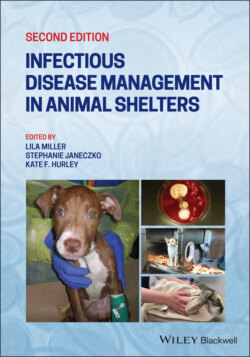Читать книгу Infectious Disease Management in Animal Shelters - Группа авторов - Страница 28
1.3.3 The Importance of Good Housing
ОглавлениеFor both dogs and cats, shelter housing plays a pivotal role in determining disease risks and spread. The quality and setup of the housing unit will impact every aspect of the animal's experience, from how well they eat and sleep to the quality of the air they breathe. In turn, these factors will in large part determine the animal's susceptibility to disease. Something as simple as separate areas for feeding/resting versus elimination can have a profound effect on animal health and well‐being.
The elements of adequate housing to support shelter animal health are described in more detail in Chapter 2 on Wellness, as well as in the ASV Guidelines for Standards of Care in Animal Shelters and other resources. For instance, a comprehensive description of cat‐housing considerations in shelters was recently published at the time of this writing. As shelter housing best practices evolve, they should be given priority and attended to meticulously. Though animal health can be preserved even in a dilapidated facility, if the housing units themselves impede an animal's ability to exhibit normal behaviors, are cramped or poorly ventilated and exacerbate noise or stress, infectious disease control will be an ongoing struggle.
